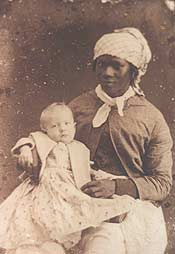
The essential journey in Beloved seems to be Sethe's journey to find validation. A quotation that stuck out to me as a reflection of this journey is "Freeing yourself is one thing; claiming ownership of that freed self is another"(95). Sethe's past as a slave stripped her of validation. Her validation was external, it was the validation others gave to her as a maid, a worker, a machine to create more slaves, etc. So after becoming free in name and action, Sethe is in a position where she no longer has someone else telling her what validates her existence. And yet, I think that Sethe doesn't fully realize her power to find her own validation until the end of the novel. Her owners are supplanted by her family. She looks to them to validate her. Her children make her validation mother, Baby Suggs makes her validation daughter. But Sethe is still unaware that there is any greater validation. It is this blindness that leads to her "thick love." Since her children define her most important validation, she can't help but love them wildly. In losing them, she would not only have to bear their torture and hers, she would have to bear separation from her validation. And in the face of this separation, in the face of this purposeless existence, Sethe decides that she might as well stop existing altogether.
This external validation continues when Beloved and Paul D. show up. She is yet to take possession of her own existence and this allows for Beloved to suck the life out of Sethe. Baby Suggs tried to teach Sethe to validate herself. Baby Suggs had noticed "'These hands belong to me. These my hands'"(141). She had realized that she could find her own validation and she tried to pass on that knowledge to everyone, including Sethe, in the clearing. But it didn't stick with Sethe, it didn't strike her. It seems as if Paul D. also tried to teach Sethe to validate herself. He "dug it up, gave her back her body, kissed her divided back, stirred her rememory and brought her more news: of clabber, or iron, of roosters' smiling, but when he heard her news, he counted her feet and didn't even say goodbye"(189). Sethe was on the brink of validation, but Paul D. leaving, Paul D. being repulsed by Sethe and scorning her decisions and her love alienated her from him and from what he was trying to teach, leaving her at the mercy of the vindictive Beloved.
Sethe's triumph in this novel is not leaving her past behind, it is not being free of Beloved, it is not accepting Paul D.'s love, it is finding her own validation for her existence. "He leans over and takes her hand. With the other he touches her face. 'You your best thing, Sethe. You are.' His holding fingers are holding hers. 'Me? Me?'"(273). Sethe is her own best thing, she is her own reason for existing, not anyone else, and it is that knowledge that brings her back to life.